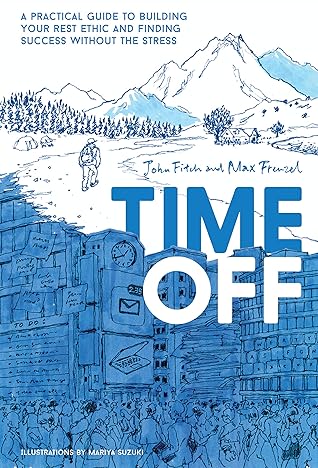More on this book
Community
Kindle Notes & Highlights
by
John Fitch
Read between
January 4 - January 30, 2023
We’re caught up in a bizarre situation where many define their dignity and self-worth through their work, but at the same time, many of us hate our jobs. Graeber calls this “the paradox of modern work,” but from the Puritan point of view there is no paradox – it all makes perfect sense. If we see work as a character-forming tool, then the more we hate work, the better.
“You feel burnout when you’ve exhausted all your internal resources, yet cannot free yourself of the nervous compulsion to go on regardless.”
Good preparation is itself a form of time off – time off from distractions in order to give undivided attention to the problem at hand.
Creativity is a constant interplay of time on (preparation, verification) and time off (incubation, illumination). Finding the right balance and flowing effortlessly between these two states is key. Many of us just hope for incubation to happen when we find some time, but the truth is we often don’t. We have to make time for it
often it can be difficult to explain that “just five minutes” actually wastes much more time than just five minutes. If it breaks our flow, even a tiny disturbance can cost us hours.
It’s a common misconception that mental faculties tire and need to be recharged. This is only partially true. What our mind really wants is for us to change things up.
It is quite conceivable that someone is overstimulated but still constantly bored.
It’s really the absence of meaning, not the absence of activity or stimuli, that makes us feel this way.
As Walker points out, “Humans are the only species that deliberately deprive themselves of sleep for no apparent reason.”
And he has always had a talent for avoiding any unnecessary admin work. “I put the onus on whoever is bringing me the paperwork,” he says. We can all learn from this. The next time someone tries to add busywork to your to-do list, ask yourself if there’s a way to make that person do the work themselves. You’ll benefit both from the immediate time off you get, as well as the more long-term effect of building a reputation that stops people from distracting you with meaningless tasks.
Cal Newport argues in his book Digital Minimalism that solitude doesn’t require physical separation from others; it’s a “subjective state in which your mind is free from input from other minds.”
“If you’re not saying ‘HELL YEAH!’ about something, say ‘no.’”
How much do I want to do this? If it’s not at least an 8 out of 10, it should be a no.
“Follow effective action with quiet reflection,” said Peter Drucker, one of the most celebrated business consultants to ever live. “From the quiet reflection will come even more effective action.”
“Choose not to be harmed – and you won’t feel harmed. Don’t feel harmed, and you haven’t been.” Choose not to be busy, and you won’t feel busy. Don’t feel busy, and you aren’t.
This way of thinking, as so many other ideas in Stoicism, lends itself well to a question that can be used as a starting point for reflection: How much of the stress and the lack of time off you experience is actually genuine, and how much are you creating yourself by worrying about your lack of time off or being annoyed at people trying to get a piece of your time?
The Stoics had a concept they referred to as the “Inner Citadel.” It is the fortress within us that nothing from the outside can perturb.
When Gopnik first saw the results of a recent wave of studies on psychedelics’ effects on the brain, she was astonished by just how similarly the brain of a young child and an adult on LSD seemed to function. “The short summary is, babies and children are basically tripping all the time.”
I’m sure I will read two sentences this year that I like more than these. I just can’t imagine what they will be.
In the words of Lao Tzu, “A good traveler has no fixed plan, and is not intent on arriving.”
In some ways, Slack and other similar tools simply allow us to take visible busyness online, and it’s part of why they are so popular and successful.
In general, anything that makes it more difficult for us to quickly switch attention is a good idea.
Newport, who happens to be a computer science professor, says we should set up “computers that are general purpose in the long run but are effectively single purpose in any given moment.”


